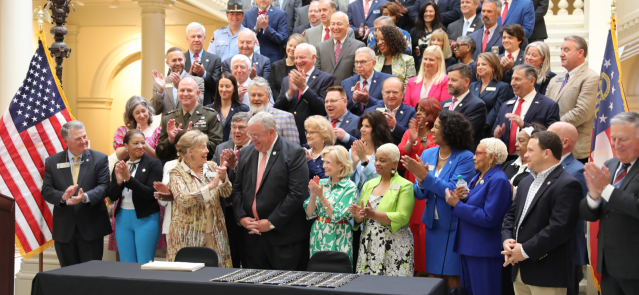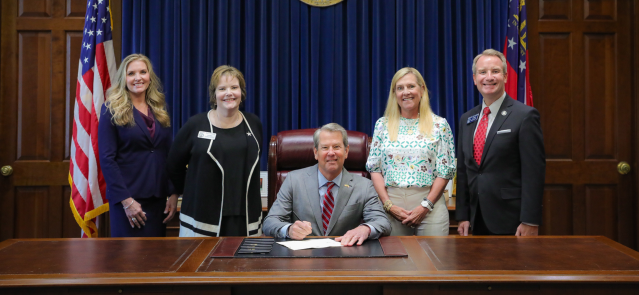Stay ahead of the curve as a political insider with deep policy analysis, daily briefings and policy-shaping tools.
Request a DemoFormer first lady Rosalynn Carter dead at 96

Former First Lady Rosalynn Carter. (Credit: The Carter Center)
ATLANTA — Rosalynn Carter, a small-town girl from Plains, Georgia who married a peanut farmer and went on to become first lady of Georgia and first lady of the United States, as well as an advocate for mental health reform, has died.
She was 96.
>> Watch: Rosalynn Carter tribute service
Her death on Sunday came less than 48 hours after she joined her husband of 77 years, former U.S. President and former Georgia governor Jimmy Carter, in hospice at their home in Plains.
Rosalynn Carter was an author and a lifelong advocate for mental health treatment and caregiving, focusing on reducing the stigma surrounding mental illness.
At a time when the topic of mental health was often swept under the rug, Rosalynn Carter boldly brought it into the national conversation. She convened a White House Conference on Mental Health, which led to the passage of the Mental Health Systems Act in 1980. While Congress repealed most of the law during the Reagan administration, her efforts laid the foundation for a more compassionate and understanding approach to mental health in the United States.
“A proud native Georgian, she had an indelible impact on our state and nation as a first lady to both,” Georgia Gov. Brian Kemp said in a tweet Sunday. “Working alongside her husband, she championed mental health services and promoted the state she loved across the globe. Their marriage, spanning 77 years, stands as a testament to their enduring partnership. Like that marriage, her achievements will stand the test of time and continue to be celebrated by those who knew her best.”
The soft-spoken Carter never took a back seat to her husband. Nor would he let her. He often reminded people she was the co-founder of The Carter Center, the internationally-renowned Atlanta-based nonprofit that works toward peace, conflict resolution and eradicating diseases.
In 1987, she founded the Rosalynn Carter Institute for Caregivers at Georgia Southwestern University, her alma mater, to support the needs of people who provide unpaid care for family and friends. The institute has since gained national prominence, and Rosalynn Carter is credited for prompting governments, businesses and nonprofits across the U.S. to address the needs and challenges of being a caregiver.
In 2013, Georgia Southwestern created the Rosalynn Carter Health and Human Sciences Complex, adding clinical space for nursing and the university’s psychology department, and a display honoring her lifetime commitment to caregiving and advocating for mental health awareness.
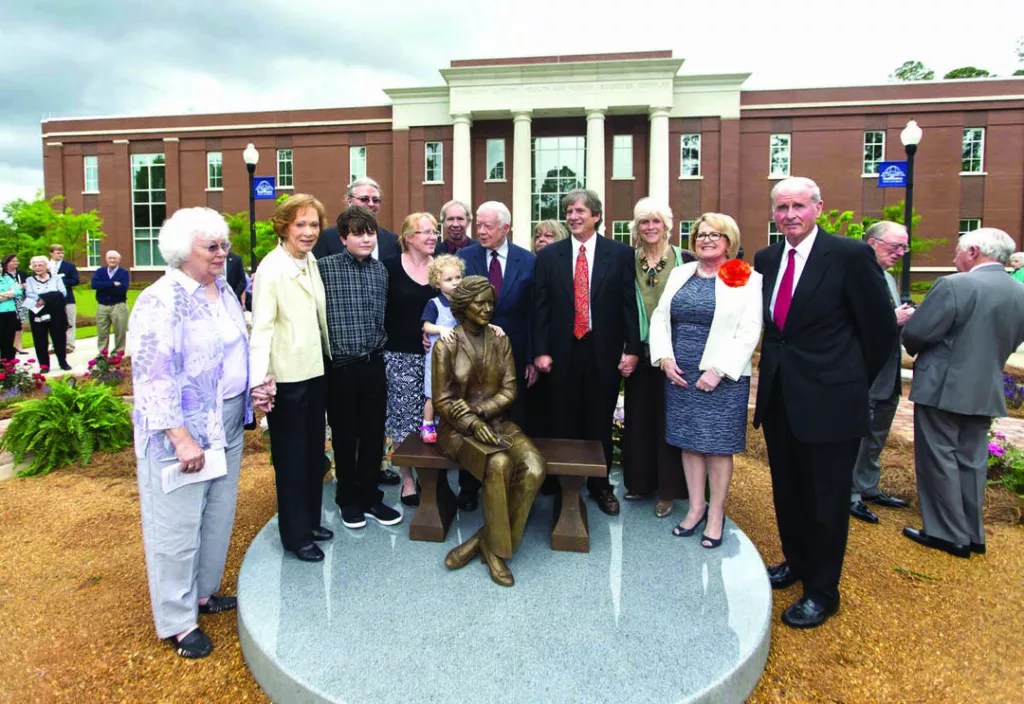
Acting and speaking as one
Carter graduated from Georgia Southwestern College in the class of 1946 and Jimmy Carter attended there before transferring to Georgia Tech and later to the U.S. Naval Academy.
With the exception of his time in the U.S. Navy during World War II, Rosalynn Carter was never far from her husband’s side. She worked alongside him as he took a stand against racism as governor of Georgia, and as he led the nation as president through the recession in the late-1970s into the early-1980s. After the Carters left politics, they went on to build homes together for Habitat for Humanity, traveling the world on peace missions and spending time in parts of Africa to eradicate diseases such as Guinea Worm and river blindness.
“If you knew them well, they literally moved and acted and spoke as one. She could read people and read the situation and that was invaluable in their relationship,” said Michele Dunn, who knew the Carters for over 20 years and spent time many weekends cooking for them.

Sen. Freddie Powell Sims, D-Dawson, whose southwest Georgia district includes Plains, agreed.

“She supported President Carter with her mind, body and spirit. I mean, she worked,” Sims, 72, told State Affairs. “She hammered he carried the wood to build houses [for Habitat for Humanity]. And she wasn’t a person that just took a photo op with her husband, or with the organization, but she was there on site for most of the build time. Not just a few hours. That was not her way. Not at all. She was a very active supporter and doer.”
Rosalynn Carter had rare qualities that suited her for the role of first lady, Sims said.
“Rosalynn was an equalizer, who had this combination of Southern charm and intellect that is such a rarity,” she added. “And just talking to her and being in her presence, her movement; just such a gentle lady, very classy, but so smart, so dedicated to the welfare of others. It’s just all of those things that you would find and you would want in a first lady of this state, of these United States, and all of the characteristics that you would want in a mother, or even a grandmother …”
Dunn recalled the time Jimmy Carter was being interviewed by a biographer for a book. Rosalynn Carter sat in on the interview and interjected often, correcting her husband’s recollection of events. At one point, he stopped, looked over at her and said, “Rosalynn, are you telling this story or am I?: Without batting an eye, she quipped: “You can, if you tell it correctly.”
“He knew she was right. It was so funny,” Dunn said, laughing. “He didn’t say another word to her about it. He turned and went on with the story. He didn’t argue. That was their relationship. She was as much a part of his life as he was.”
Dunn said Rosalynn Carter had a knack for reading a room and figuring out who people were. And for that reason, Jimmy Carter came to trust and rely on her judgment, Dunn said.
“… I honestly think he never made a decision without her,” Dunn said. “I know them so well, that if she had been against something, I can never imagine that he would have gone against her better judgment because her better judgment was his judgment. Literally to me, they were one soul in two bodies.
“They could shut the world out, and did. I’ve watched him do it at dinner. They would have a private word with each other or there would be a glance and it was like there was nobody else in the room. They knew exactly what the other one meant by that.”
While Dunn said she cooked for the Carters most weekends for years, the couple would never let anyone serve them, preferring instead to serve themselves during the buffet-style meals. Dunn remembers one time when the former first lady ducked into the kitchen after one of the weekend meals and insisted that she wash the dishes. Rosalynn Carter was summarily dismissed from kitchen duty. Dunn says Carter loved Italian cuisine, especially her manicotti and once requested icebox pie, which Dunn made using fresh peaches.

Eleanor Rosalynn Smith was born in Plains, Georgia on Aug. 18, 1927 to Allethea “Allie” and Wilburn Edgar Smith. She was delivered by Lillian Carter, a trained nurse and Jimmy Carter’s late mother. Her future husband got a glimpse of Eleanor Rosalynn Smith a few days after her birth when the toddler Jimmy accompanied his mother to check on the newborn.
The former first lady was thrust into responsibilities at an early age. Her father died when she was 13 years old, and as the oldest child, she helped her mother manage the household and raise her three siblings. In 1944, Rosalynn Carter graduated from Plains High School as the valedictorian. Two years later, she graduated from Georgia Southwestern College.
Carter literally married the boy next door who went on to become a Naval nuclear engineer, governor of Georgia and the nation’s 39th president. She and Jimmy Carter married on July 7, 1946. They are the longest-married presidential couple in U.S. history.
Their partnership in public service intertwined with their love story extended well into their nineties. Over the last decade, the Carters worked on bringing a medical clinic to Plains, fundraising for the local Boys & Girls Club, and helping low-income residents in Sumter County repair and gain title to their homes.
“And this is the kind of work ethic that you find in rural Georgia,” said Sims. “Because your resources are scarce. … Everybody takes care of everybody. And that’s what they did.”
Jill Stuckey, superintendent of the Jimmy Carter National Historical Park, and a longtime family friend, got to know the Carters when she worked for the state environmental agency. As of late, she has tended to some of the Carter’s creature comforts, stoking their fireplace and sharing the last of the sugar cane syrup squeezed on the family farm in nearby Archery, as the Carters took in the news on MSNBC.
“Mrs. Carter was the epitome of grace and humbleness,” she said. “She was quiet and reserved but a force to be reckoned with when needed. I will forever cherish our friendship.”
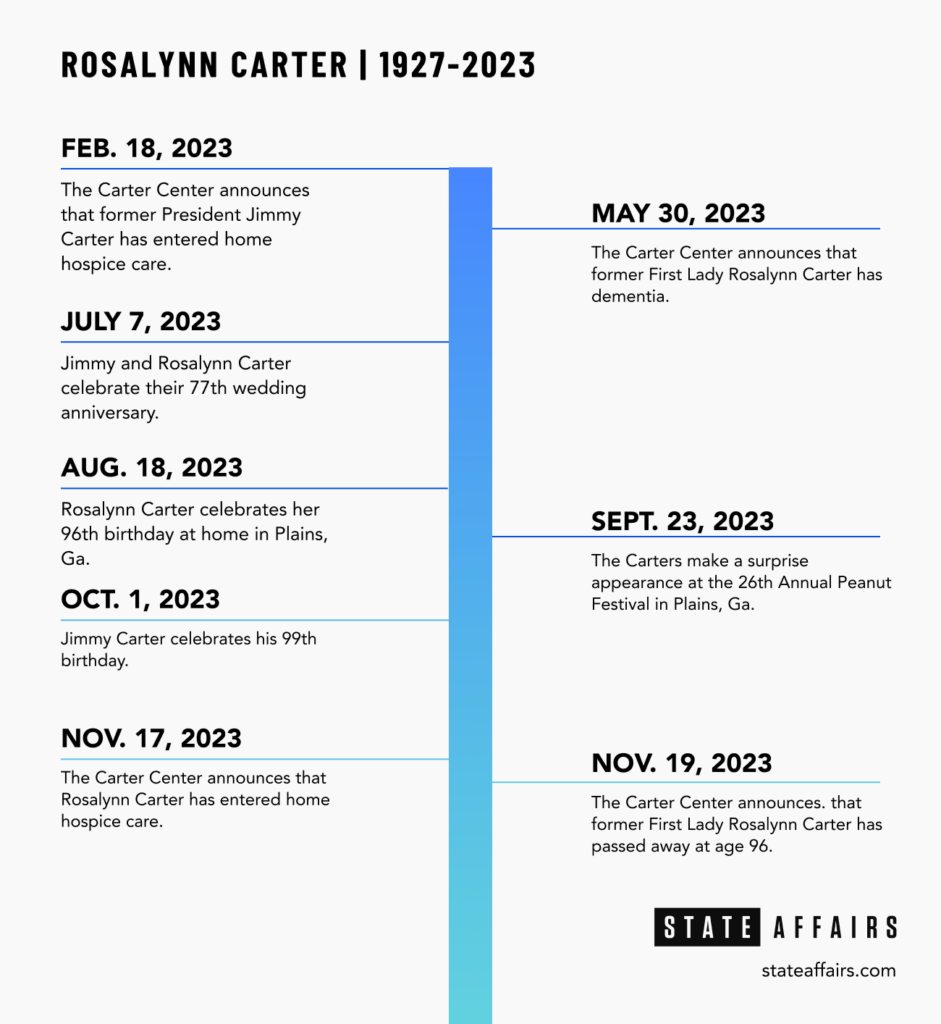
Praises pour in
As news of Rosalynn Carter’s passing spread Sunday, tributes poured in from across the political spectrum and around the world.
Among the first came from her husband of 77 years. In a statement to the Carter Center, President Carter said, “Rosalynn was my equal partner in everything I ever accomplished. She gave me wise guidance and encouragement when I needed it. As long as Rosalynn was in the world, I always knew somebody loved and supported me.”
In addition to the former president, she is survived by her children — Jack, Chip, Jeff, and Amy — and 11 grandchildren and 14 great-grandchildren. A grandson died in 2015.
“Besides being a loving mother and extraordinary First Lady, my mother was a great humanitarian in her own right,” said Chip Carter. “Her life of service and compassion was an example for all Americans. She will be sorely missed not only by our family but by the many people who have better mental health care and access to resources for caregiving today.”
Former President Barack Obama tweeted, “Rosalynn Carter was a true champion for mental health and a shining example of grace and compassion. Her legacy will continue to inspire us all.”
Former first lady Michelle Obama echoed her husband’s sentiments, saying, “Rosalynn Carter’s dedication to service and her tireless advocacy for the most vulnerable among us will forever be remembered. She was a trailblazer and a role model for us all.”
Georgia Senators Raphael Warnock and Jon Ossoff also extended their condolences Sunday.
“As a champion for all Georgians, Rosalynn’s impact on our state was immeasurable,” Warnock tweeted Sunday. “She embodied the principles of love, justice, and humility that resonate in our faith traditions. Moreover, her commitment to destigmatizing mental health care, strengthening human rights and improving global health was an extension of her faith and a testament to her caring spirit. Her work was not about politics — it was about uplifting the vulnerable, showing mercy, and embodying her belief that we are all connected.”
“A former first lady of Georgia and the United States, Rosalynn’s lifetime of work and her dedication for public service changed the lives of many,” Ossoff said in a statement. “Among her many accomplishments, Rosalynn Carter will be remembered for her compassionate nature and her passion for women’s rights, human rights, and mental health reform. Georgia and the United States are better places because of Rosalynn Carter.”
Read these related stories:
Senior reporter Jill Jordan Sieder contributed to this report.
Share your thoughts about Rosalynn Carter with State Affairs at [email protected].
Contact Tammy Joyner on X @lvjoyner or at [email protected]. And sign up for our free newsletter so you do not miss an update.
X @StateAffairsGA
Instagram@StateAffairsGA
Facebook @StateAffairsGA
LinkedIn @StateAffairs
Know the most important news affecting Georgia
Get our free weekly newsletter that covers government, policy and politics that impact your everyday life—in 5 minutes or less.
Unlimited Access: Subscribe for just $2.99/mo billed monthly.
Subscribe NowGet unlimited news access
Already a member? Login here
Weekend Read: Mesha Mainor expected to face uphill battle to retain seat — even against little-known competitors
Three of the four candidates for Georgia House District 56 in southwest Atlanta are scheduled to appear at a forum in Fulton County next week, just a few days ahead of the May 21 primary election.
Rep. Mesha Mainor won’t be among them. The incumbent, an Atlanta native running for her third term, said she won’t go because her alleged former stalker — one of her Democratic challengers — will be there.
But in any group of Democrats gathered in Atlanta lately, Mainor is the odd woman out. Since switching to the Republican Party last July, she has earned the enmity of many of her former Democratic colleagues, as well as the voters who elected her.
Mainor’s strong support for bills creating private school vouchers and disciplining prosecutors last year made her a pariah among some in her party. After Mainor cast the lone Democratic vote for Senate Bill 233, the Georgia Promise Scholarship Act, which narrowly failed, Sen. Josh McLaurin, D-Sandy Springs, said that “a Democrat who votes to defund public education should be primaried,” and posted online a photo of a $1,000 check awaiting Mainor’s primary challenger.
More condemnation and criticism from other Democrats followed, leading Mainor to announce last July that she was leaving the Democratic Party due to their “harassment” and intolerance. In doing so, she became the only Black member of the GOP among Georgia’s 236 lawmakers and the first Black Republican woman to ever serve in the Georgia General Assembly.
This year Mainor voted as a member of the Republican majority to pass the school voucher bill, as well as Senate Bill 332, which empowers the oversight commission aimed at disciplining “rogue” and errant prosecutors.
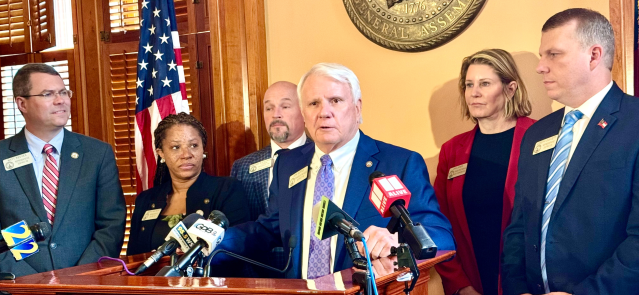
‘Dead woman walking’
Mainor’s Republican colleagues have praised her for taking a stand on the two bills, despite the political cost.
“She was a leader on that education reform bill from start to finish,” said Rep. Matt Reeves, R-Duluth, adding that “here in Georgia, I think that people want to see problem solving and effectiveness and delivering results. And that’s what she has done.”
House Speaker Jon Burns, R-Newington, told State Affairs that “[Mainor’s] support of school choice legislation played a vital role” in the bill’s passing. He added, “Representative Mainor’s dedication to common-sense policies that support Georgia’s children, families and communities has been evident since day one.”
Still, Mainor, who has no Republican primary opposition, faces long odds for reelection in November in her strongly Democratic district, where 90% of voters chose Joe Biden for president in 2020.
House District 56 is 47% Black, 32% White, 10% Asian and 6% Hispanic or Latino, and 26% of residents live below the poverty line, according to 2022 data from the Atlanta Regional Commission.
“She has incumbency in her favor, and she’ll do better than most Republicans in a heavily Democratic district where African Americans are a key constituency, but she will get nowhere close to 50% plus one vote,” said Charles Bullock, a political science professor at the University of Georgia.
“She alienated everyone in the Democratic caucus and engendered animosity among her colleagues” through her unpopular votes, he said. And once Mainor switched parties, “she was a dead woman walking from that point on,” Bullock said. “I would imagine most Republican strategists have written that district off.”
“Party matters,” said Andra Gillespie, a political science associate professor at Emory University. Although “there is a diversity of thought within Black communities on issues related to school choice, this is likely not the top issue for voters in her district in this cycle,” Gillespie said. “And Democratic voters as a whole tend to penalize more conservative candidates. Party switching kind of goes beyond the pale. … While she may have some residual level of support as an incumbent, most people are not going to defect and go vote for her because they’ve known her before. Partisanship is going to hold that back.”
Mainor’s Democratic challengers


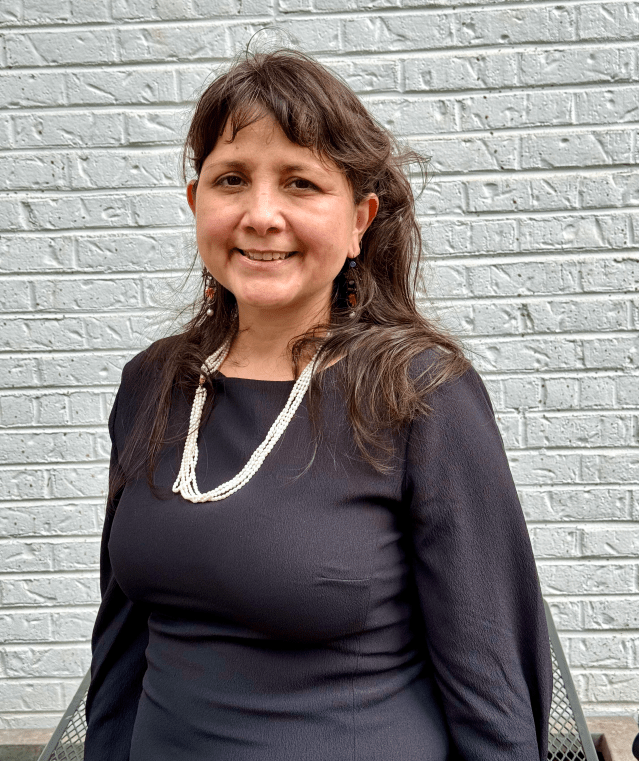
Mainor’s first Democratic challenger to emerge was Bryce Berry, a 22-year-old seventh-grade math teacher and president of the Young Democrats of Georgia.
Originally from St. Louis, Berry said he got involved in community organizing as a teen after the shooting death of Michael Brown by police in nearby Ferguson in 2014. At Morehouse College, Berry started a state-level student group to help elect Joe Biden and Kamala Harris in 2020 and then led college voter mobilization efforts for the Georgia Democratic Party in 2022.
Berry has since won the endorsement of dozens of Democratic state legislators, including most of the House leadership. He also has the backing of several Atlanta school board members, Fulton County commissioners and Democratic student organizations at Spelman and Morehouse colleges.
Berry, a teacher at Young Middle School, in southwest Atlanta has raised $36,350 in campaign contributions since last July, and his campaign war chest held $19,150 as of April 30. Mainor, meanwhile, reported raising $62,863 over the last three quarters and had $12,420 in her campaign account through April.
Berry’s platform includes measures around education reform, expanding Medicaid coverage, raising the minimum wage and working with local and federal governments to create more affordable, mixed-use housing developments in Georgia.
“Fundamentally, Rep. Mainor has left our community behind,” Berry said. “It’s not just about her switching parties; it’s about her actions. …Voters in my district feel like they are not being heard by the state, their needs are not being met and they’re ready for a return back to a visionary, progressive Democrat who will work tirelessly to improve their lives.”
Emory’s Gillespie said Berry appears to be the front-runner in the District 56 Democratic primary.
The Democratic candidate with the next-best level of name recognition in House District 56 is likely Corwin “CP” Monson.
Monson, 50, an audio engineer, was a volunteer in Mainor’s unsuccessful campaign for Atlanta City Council in 2019 before she fired him for being disruptive, she said. Soon after, she accused him of stalking her. A Fulton judge granted a temporary protective order against Monson, who was later arrested for violating it.
In September 2021, in a plea deal offered by Fulton County District Attorney Fani Willis, Monson pleaded no contest to aggravated stalking charges and accepted a three-year sentence — one in prison and the rest on probation. Having already served 10-and a-half months in jail, he was released in November 2021.
Monson has denied stalking Mainor, who he said has “lied and committed character assassination” against him. He told State Affairs he took the plea deal to get out of jail after his lawyer told him a court backlog in Fulton County meant his case might not be heard for another two years.
Monson, who has been endorsed by former state representative for District 56 “Able” Mable Thomas, is campaigning on economic development and education reform, including making the school funding formula “more equitable” for low-performing and rural schools.
Monson also seeks to expand Medicaid and other affordable health care options, as well as pursue criminal justice reform.
He reported $1,005 in campaign donations as of January, but has not yet filed a campaign finance report for the first quarter of 2024, which was due on May 7.
Last week, Mainor announced she is suing Fulton County, Willis and Fulton County Commissioner Marvin Arrington (who initially represented Monson) in civil court for their mishandling of the stalking case against Monson, which she said was not properly investigated, was sidetracked due to interference from Arrington and resulted in a too-lenient sentence.
Also challenging Mainor is Adalina “Ada” Merello, a 42-year-old waitress who has lived in Vine City in House District 56 for two years.
Originally from Eugene, Oregon, she has an extensive background in government and campaign-related work, including working for former Atlanta Mayor Kasim Reed on neighborhood improvement and service-based initiatives and volunteering for the campaigns of former President Barack Obama in 2012, gubernatorial candidate Stacey Abrams in 2018 and U.S. Rep. Nikema Williams and U.S. Sens. Jon Ossoff and Raphael Warnock in 2020 and 2021.
“I’m running because the neighborhood has been misrepresented for too long,” Merello told State Affairs. “Recently, we’ve had backstabbing with misrepresentation,” she said of Mainor’s party switch. “But I believe prior to that, we just don’t have a loud enough voice at the Gold Dome. So I’m newer in the neighborhood, but what I’ve seen is just people living their day-to-day lives, wanting life to be a little easier. And I don’t mean that in a handout way but a hand-up way, of people helping each other.”
Her campaign platform includes mental health reform, with a focus on further implementing some of the parity goals established in the major mental health legislation passed in 2022.
Merello, who has openly discussed her bipolar disorder diagnosis, said she “wants to normalize mental health issues and treatment to make life easier for people who’ve had lives like mine.”
She also wants to improve public schools, create more food security for low-income residents, enact more tenant protections and expand LGBTQ+ rights.
Merello reported $13,219 in campaign contributions as of April 30.
Running on her record
Shrugging off Democrats’ criticism , Mainor, 49, maintains she is “extremely proud” of her advocacy for “the school choice bill,” which she said will deliver sorely needed education options to families in her district, where only 2% or 3% of students at some schools meet reading and math proficiency levels, she said.
Mainor grew up in the Hunter Hills neighborhood of District 56, where she said property and violent crimes, prostitution and the drug trade were rampant and students like her were stuck attending low-performing, poorly equipped schools. She said her mother “worked the system” to enable her to attend Mays High School across town, a better public school that put her on a path to attend Howard University.
“Currently, my district has the most charter schools than any other district in the entire state,” she said. “And what does that mean? That means parents want options and choices. And I do believe school choice is going to create a competitive environment; it’s going to change the dynamics of the education system, which needs to happen. I mean, we really do need to look at how education is done. The school board essentially controls the curriculum, and it’s not serving all students well enough. … And so I think SB 233 will allow families to kind of pick what they want.”
Besides improving educational opportunities for children, Mainor said she’ll continue to focus on public safety and criminal justice reform. She pointed to a bill she sponsored last session, House Bill 1165, that will bring in $7.5 million in federal funds for gun violence prevention programs in Georgia, which Kemp signed in April. She also worked this year with Rep. Reeves on House Bill 926, also known as the Second Chance Workforce Act, which allows people to keep their driver’s licenses and “to still be able to get to work” while they’re awaiting court appearances. Kemp signed it last week.
In 2023, as a Democrat she authored House Bill 142, the Unified Campus Public Safety Act, which allows police on the multiple Atlanta University Center campuses in southwest Atlanta to cross boundaries and collaborate, which she said was in response to campus shootings and bomb scares.
Mainor pointed to other accomplishments during her two terms, including her bill in 2021 to create the Fulton Technology & Energy Authority, an agency that fosters the development of energy-saving technologies that she said will lower the energy burden and create good-paying, green jobs for her constituents.
If reelected, her “key priorities are going to be continuing in the education space,” she said. “But in addition to schoolwide things, I really want to focus on the criminal justice system. I want to see what kind of resources you have while you’re in jail that are getting you ready for when you go out of jail and then when you’re on probation, because we really need to be more comprehensive with the resources we’re giving ‘second chance’ citizens once they come out.”
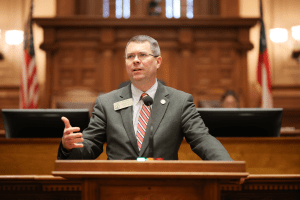
Reeves, who serves on two House judiciary committees, said Mainor “has a passion for workforce issues and upward mobility of young people. … I think her mindset is rather than having people unnecessarily go to jail or go to prison, to figure out a way to not have their work and education disrupted. And that invariably touches on legal and criminal and public safety issues, so we’ve had multiple chances to work together. And what I’ve seen is she’s very educated, intelligent, a deep thinker in terms of legislative matters. She gets the big picture and the philosophical issues, but she’s always working on the practical part of it to help out her constituents.”
Mainor said she has enjoyed accomplishing more as a legislator in the Republican majority.
“Mentally, I’m in a better place because I don’t have the hostility on one side, because of my vote on school choice or whatever vote I did. And so I feel like I’m in a space where I am encouraged,” she said. “And I got a lot more done this year than I did last year.”
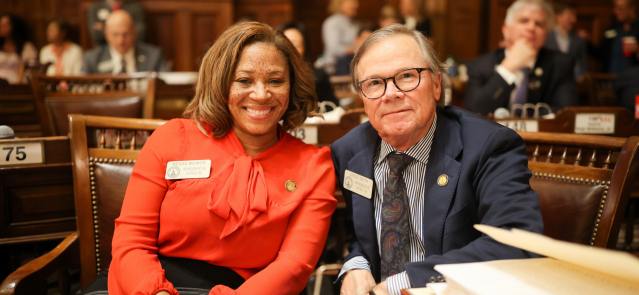
She said she is relying on voters in her district to “look at my record and reflect on what I’ve been able to deliver and see how that compares to what you’ve gotten from Democratic representation in recent years. I tell people, ‘Now you have someone at the other side of the table, sharing what your needs are, because right now [the Republicans] don’t know. I’m able to go and say this type of community needs this. Right now they have no idea.’”
Mainor said, “People in the community have told me, ‘You have helped us and we don’t care what letter is next to your name,’ and sent texts saying, ‘I guess I’m gonna vote across the ballot.’ Many people are coming to me secretly. You know, being Black and a Republican is taboo. You’re not allowed to be a Republican if you’re Black. You’re bound to face bullying and ridicule. Nobody, no one feels like they can just come out and say it, and that’s fine. I just need them to vote for me at the ballot box.”
Gillespie of Emory said Mainor might be expecting too much from voters.
“As a third-term incumbent, you have an incumbency advantage, but you haven’t built up a long-term reservoir of goodwill yet, compared to someone who’s held on to the seat for, say, 20 years,” she said. “It’s a risky thing to get ahead of your constituents on policy, when your constituents aren’t animated by the same issues that you are. And now we’re going to see what the impact of that is.”
Early voting is underway through May 17, and primary election day is May 21. Primary runoff elections, if needed, will be held June 18. The general election will happen Nov. 5.
Read these related stories:
Have questions, comments or tips? Contact Jill Jordan Sieder on X @journalistajill or at [email protected].
Kemp signs a bevy of bills on elections, public safety and workforce development
The Gist
Gov. Brian Kemp on Tuesday ended a six-week whirlwind statewide bill-signing tour that enacted hundreds of new laws governing agriculture, families, elections, public safety and workforce development.
He also vetoed a dozen bills — including those dealing with homestead exemptions and easing eligibility for the HOPE Scholarship for former foster youths — during that time.
What’s Happening
All told, Kemp signed 709 bills into law in the 40 days since the 2024 legislative session ended in the early hours of March 29. The most crucial piece of legislation, by far, was the $36.1 billion fiscal year 2025 state budget, which included 12 disregards. A disregard is when a state agency is directed not to spend the money allocated for a specific item.
“He didn’t have any real disregards. The majority of these are clarifications,” Kemp spokesman Garrison Douglas said of the governor. “Agencies were given more specific instructions on how to spend the money.”
Bills impacting education, health care, military members, human trafficking and Georgia’s coastal communities were among those Kemp signed in the month following the session’s end. Other notable legislation:
- Police and property owners now have more tools to remove squatters, people who have illegally taken over a private home or property.
- Homeowners associations are now required to notify homeowners in writing of a covenant breach and give them time to fix it before the HOAs take legal action.
- Families of students in low-performing school districts may now receive scholarships, commonly referred to as vouchers, of $6,500 per child to be used for private school tuition or homeschooling expenses.
Additional legislation the governor signed over the last two weeks includes:
Agriculture

- Kemp signed a package of bills meant to provide further protection for the state’s No. 1 industry. The new laws are intended to ban “adversarial” countries from owning Georgia farmland, ease high input costs for farmers, protect children from misleading and dangerous marketing, and hike penalties for livestock theft.
Children & Families
- Senate Bill 376 improves timely permanent placement of a child removed from his or her home by the Georgia Division of Family and Children Services.
- Senate Bill 387 provides free state identification cards for children between the ages of 14 and 17 who are in the custody of the Division of Family and Children Services.
Elections

Any Georgia resident can now challenge another resident’s voter eligibility under a new law the governor signed in April, setting up probable cause to have voters removed from the rolls, critics say. Senate Bill 189 also allows a presidential candidate from any political party to be on the ballot as long as that person qualifies in at least 20 other states. It’s one in a package of election-related bills that critics say could impact the outcome of the 2024 and other future elections.
- House Bill 974 gives the public online access to photos of ballots cast in elections on the Georgia Secretary of State’s website, requires watermarks on ballots and uses technology to verify the text on ballots cast. The bill also requires a percentage of ballots in select statewide elections to be audited.
- House Bill 1207 gives election supervisors the flexibility to change the number of voting booths in precincts.
Public Safety
- House Bill 1105, the Georgia Criminal Alien Track and Report Act, creates a new immigration law that requires law enforcement to determine the nationality and immigration status of people they detain and requires the Department of Corrections and sheriffs to notify federal authorities when they have undocumented immigrants in their custody. Failure to enforce the law could cause local governments to lose state and federal funds, and law enforcement officers and government officials could face misdemeanor charges.
- Senate Bill 63 adds 30 more criminal charges to those requiring cash bail for release, including 18 misdemeanors, such as criminal trespass, forgery and failure to appear. The bill also limits what charitable organizations can do to provide bail to people in jail and establishes that individuals and organizations cannot post more than three cash bonds per year to secure a person’s release. Legal defense organizations say it unfairly limits their work and violates the rights of those accused, and they plan to sue the state to overturn the law.
- Senate Bill 465 creates a new type of offense — felony aggravated involuntary manslaughter — for selling fentanyl to someone who dies from taking the potent drug. Dealers could be prosecuted under the new law whether or not they knew the drug they sold contained fentanyl. Penalties range from a minimum of 10 years to 30 years or life imprisonment.
Workforce Development
Several bills were enacted to help students take advantage of dual enrollment and technical education programs, especially those in high-demand career fields.

- House Bill 982 directs the State Workforce Development Board to create the High-Demand Career List. Colleges, technical schools and high schools currently use conflicting lists, so this unified list will eliminate confusion among students, parents, educators and agencies about what careers are considered high-demand.
- Senate Bill 440 creates the Accelerated Career Diploma Program and simplifies the pathway for students to receive dual enrollment funding for more than 30 hours.
- Senate Bill 497 expands the apprenticeship programs in high-demand career fields and creates a pilot program for public service career apprenticeships.
The Legislature considered more than a dozen bills related to occupational licensing. Among those that passed:
- Senate Bill 354 removes the licensure requirement for beauticians who blow-dry hair, wash hair or apply makeup. The bill doesn’t include other services, such as cutting hair, applying dyes, bleaching or using chemicals, which will still require a cosmetology or esthetician license.
- Senate Bill 373, requires the Board of Marriage and Family Therapists to issue an expedited license to any individual moving from another state who has a current valid license to practice in that state and is in good standing with that state.
- Senate Bill 195 makes Georgia the third state to join the Social Work Licensure Compact. Once seven states have joined, the compact will become functional and allow social workers with valid licenses in good standing to practice in member states.
View Kemp’s 2024 signed legislation here.
Here are some of the bills Kemp vetoed:
House Bill 1231 would have expanded the Georgia Tuition Equalization Grant (TEG) Program, HOPE Scholarship and Dual Enrollment Program eligibility for certainprivate, nonprofit institutions; allowed HOPE Scholarship recipients to use unusedcredit hours to get a first professional degree; and removed the initial and first-year achievement standards of the HOPE Scholarship for former foster youths. Kemp said he vetoed the bill because none of the three proposals were accompanied by additional funding or fiscal analysis.
Senate Bill 368 would have prohibited foreign nationals from making political contributions, which is already banned by federal law. Kemp vetoed the bill at the request of the bill’s sponsor, Sen. Rick Williams, R-Milledgeville.
House Bill 1019, as originally introduced, would have doubled the statewide homestead tax exemption to $4,000 from $2,000 if voters approved it in a referendum. But on the last day of the legislative session, the Senate adopted a floor amendment to return the bill to its original form. That amendment did not change the language of the constitutionally required voter referendum, which references a $10,000 exemption. Voters would therefore be approving a different exemption, which the Legislature did not pass. Conflict between the statutory and the referendum language led Kemp to veto the bill.
See the governor’s statements on all the bills he vetoed here.
What’s Next?
Most of the new laws took effect upon signing or will take effect July 1 unless otherwise noted.
Read these related stories:
Have questions or comments? Contact Jill Jordan Sieder on X @journalistajill or at [email protected] and Tammy Joyner on X @lvjoyner or at [email protected].
And subscribe to State Affairs so you do not miss an update.
Rural communities hopeful Kemp change to state soil amendment law will curb stink
After seven years and millions of dollars in restoration, Heritage GA opened its door last month to those seeking solitude and a chance to commune with nature. But the constant presence of trucks hauling a noxious concoction of waste byproducts from poultry processing plants threatens to ruin those plans.
The historic Catholic retreat sitting on 200 acres near Sharon is meant to be an economic boon and tourist attraction for Taliaferro (pronounced “Tolliver”) County, a poor, mostly Black county of 1,600, situated 90 miles east of Atlanta.
“It’s a very historic, sacred site. Our business is being threatened by this soil amendment. It’s [the retreat] been a major financial investment in the county and in the state and it’s really helping,” Betsy Orr, chief executive officer of Purification Properties LLC, which restored the retreat — a tribute to the first Catholic settlers who arrived in Georgia in 1790.
The sludge, known as soil amendment, is being transported to a hog farm about 1.5 miles from Heritage. The former hog farm was cited by the state Environmental Protection Division after residents complained that the waste being spread on the farm had polluted a nearby creek. The property owner resolved the consent order requiring him to pay $5,000, mark the buffer area on the farm and ensure no soil amendment is applied to that area, according to EPD spokesperson Sara Lips.
The Heritage property includes a commercial building, barn, cottages, prayer spaces, walking trails and the oldest Catholic Cemetery in Georgia. Orr predicts that if the smell from the former hog farm reaches Heritage, “it’s going to wreck our business.”
On Monday, Orr breathed an inward sigh of relief when she learned that Gov. Brian Kemp signed a bill into law that could prove fortuitous for landowners and other businesses battling problems created by soil amendment.
The new law adds a provision to the state Soil Amendment Act of 1976 that stops companies from hauling or receiving soil amendment if they’ve been notified by EPD to resolve an outstanding dispute or complaint. The notification is known as a consent order. The new law is effective July 1.
“It’s good because the state and the Agriculture Department have really prevented that kind of bill from being enacted because they say that it’s to the farmer’s benefit to be able to use the soil amendments,” Orr said.
Orr’s comments are a common refrain from business owners and families with properties in rural Georgia who sit near soil amendment sites and who complain of vultures, hordes of flies and unbearable smells floating across their properties.
“The problem is a lot of the soil amendments are causing pollution. They are stinky, nasty wastewater and other products,” Orr said. “Sometimes it is not even what they are allowed to dump. Finally, they have passed this amendment, and I hope they enforce it. Some of the things that these people are dumping are … ruining the landowners around them and the state has got to start caring about that.”
Doug Abramson, a retired corporate lawyer who lives in Wilkes County where a soil amendment runoff killed 1,700 fish in the Little River July 2022, called the new law “a step in the right direction.”
“Many counties throughout the state are encountering problems with sludge, improper dumping, and [other] soil amendment issues,” said Abramson, who along with his wife Susan have been working to address the problem for about a decade. “This [new law] is at least a recognition that there are problems out there. I do think the state could do better. The Department of Agriculture could do better but it is a step in the right direction.”
Have questions? Contact Tammy Joyner on X @lvjoyner or at [email protected].
Watch live: Kemp signs $36.1B budget bill
Today is the deadline for Gov. Brian Kemp to either sign or reject bills passed by the Georgia General Assembly during this past legislative session. Arguably, the biggest of those bills is the annual budget. Kemp and first lady Marty Kemp will be joined by Lt. Gov. Burt Jones, House Speaker Jon Burns, and members …


